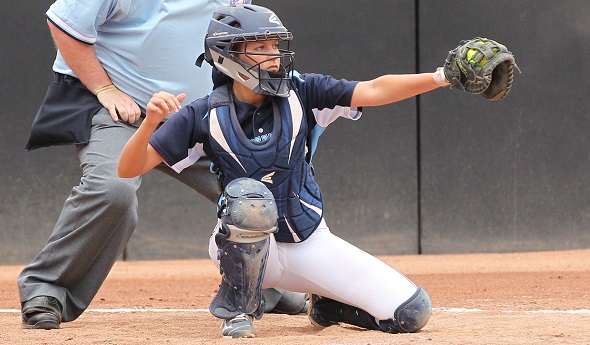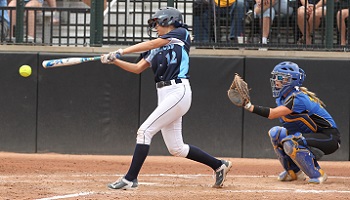
Catcher's Grit Shines in Health Scares
By
Tom Markowski
Special for Second Half
April 9, 2018
RICHMOND – Evelyn Swantek couldn’t have imagined what her day would be like when she awoke on Aug. 8 of last year.
 Dressed in shorts and a T-shirt on a seasonably warm summer morning, Swantek went for a mile run as part of the training that all varsity volleyball players at Richmond High School were expected to complete.
Dressed in shorts and a T-shirt on a seasonably warm summer morning, Swantek went for a mile run as part of the training that all varsity volleyball players at Richmond High School were expected to complete.
Near the end of her run, Swantek noticed something wasn’t quite right. A bit of fatigue, yes, but it was more than that. She went home and told her father, Dave Swantek, that she was going to take a nap. But when she awoke, her world changed dramatically.
“It came out of nowhere,” she said. “I woke up and couldn’t talk. Part of my face went numb and I couldn’t see out of my right eye. And my neck was really big.”
A bit dazed by the sudden physical change of the youngest of his three daughters, Dave Swantek drove her to the hospital not knowing what was wrong.
Thankfully, Dave was home on a vacation day while his wife, Julie, was at work. He was attending to a couple of odd jobs around the house when his daughter came home.
“Evie came in and said she was tired, and wanted to take a nap,” he said. “She got up and came downstairs; immediately I knew something was wrong. It’s something, as a parent, you just don’t want to see.”
The Swanteks arrived at McLaren Hospital in Mount Clemens and, after the diagnosis, were told that Evie had developed blood clots – one in her throat and one in her face, and that she had suffered a Transitory Ischemic Attack (TIA), commonly known as a mini-stroke.
Dave Swantek said the doctors immediately took his daughter off the blood-clotting medication she had been taking since January.
On New Year’s Eve, 2016, Evie experienced abdominal pain while celebrating the arrival of the New Year with family members. She was taken to McLaren Hospital, where exploratory surgery was performed and she was diagnosed with endometriosis. Endometriosis is a condition in which a layer of tissue that normally covers the inside of the uterus grows outside of it. One of the main symptoms is pelvic pain.
 At the time, the Swanteks never gave it a second thought. Evie took medication, didn’t miss a day of school and continued to compete on the varsity basketball team. After that season ended, Evie made the varsity softball team for the first time and was named the starting catcher by coach Howard Stuart. Richmond won the MHSAA Division 2 title in 2016, and the Blue Devils reached the championship game again in 2017 only to lose to Ida, 8-4, in nine innings in the Final.
At the time, the Swanteks never gave it a second thought. Evie took medication, didn’t miss a day of school and continued to compete on the varsity basketball team. After that season ended, Evie made the varsity softball team for the first time and was named the starting catcher by coach Howard Stuart. Richmond won the MHSAA Division 2 title in 2016, and the Blue Devils reached the championship game again in 2017 only to lose to Ida, 8-4, in nine innings in the Final.
Seven weeks later, the Swanteks’ world turned upside down. And it would take nearly three months for their world to be turned right side up.
“It was a warning sign,” Dave Swantek said of the blood clots and the mini-stroke. “The medication she was on was clotting. Then they took her off of it. It gave us time to find out what was wrong. And this went on for a long time.”
Not knowing the exact cause and the proper medication was disconcerting to the Swanteks.
“They had no clue,” Evie said. “I kept asking (the doctors) what’s wrong. They said they didn’t know yet. I was sitting in the hospital just thinking, this is scary.”
For about a six-week period, Evie was in and out of the hospital three or four times – doesn’t recall the exact number. The illness prevented her from competing in volleyball and basketball, and for a senior, that can be difficult to handle. She also can’t give the exact number of days of school she missed, but she does remember missing a couple of football Friday nights, which did not sit well with her. Evie was able to attend Homecoming, however.
All during this time one thought, one goal, weighed heavily.
“Not knowing if I was going to play softball was hard,” she said. “I kept asking the doctors, ‘Will I be able to play?’ That’s my favorite. I’ve been playing since I was 7. I’ve been playing travel (softball) since I was 8. And I’ve always been a catcher.
“It was hard on my parents, too. It was frustrating.”
This frustration and uneasiness came to a head one evening while Evie was watching television.
“I started to have these chest pains,” she said. “I’m lying on the coach, and it’s starting to hurt real bad. And I have a high threshold for pain. I broke my wrist (glove hand) and played three more tournaments, so it has to be a lot of pain for me to do something about it. I had had these chest pains before, but this time it was really bad. I rolled up into a fetal position, it was so bad.”
Said her father: “I remember that. I rushed to (McLaren) hospital and the people in the emergency room looked at us and it was like, what now? It took them three days to find out. The doctors kept saying they don’t know.”
 Dave Swantek said the doctors changed medication, from one blood thinner, taken orally, to one that was administered intravenously. In the end, that did the trick. Evie said she’s feeling better since the switch was made and the application, after a couple of tries, became second nature. She’s able to administer the shots by herself.
Dave Swantek said the doctors changed medication, from one blood thinner, taken orally, to one that was administered intravenously. In the end, that did the trick. Evie said she’s feeling better since the switch was made and the application, after a couple of tries, became second nature. She’s able to administer the shots by herself.
Dave Swantek gushes when he talks about how well his daughter has handled this situation. He said the doctors who have either diagnosed or treated Evie have offered to have a psychologist meet with her in an effort to make sure she recovered mentally from the ordeal.
“The coping mechanism she has displayed is amazing,” he said. “She’s been amazing through it all. She lost two sports – two sports she played her whole life. She loves volleyball and basketball. There were times they were throwing all kinds of medication at her, trying to find out what works. When they can’t tell you what’s wrong with your daughter, it’s a challenge. It was a rough time. She did a wonderful job.”
There is a happy ending. Evie is playing softball and expected to be one of Richmond’s top players. She’s down to one shot per day and she’s hoping, after she and her parents meet with the doctors April 26, that she will be taken off medication.
And her future looks bright on the diamond. She’s received a scholarship to Oakland Community College where one of her sisters, Ally, a sophomore, is a student.
“I’ve had the best support system you could imagine,” Evie said. “My parents, my family, have been so great. It’s been very comforting.”
 Tom Markowski is a columnist and directs website coverage for the State Champs! Sports Network. He previously covered primarily high school sports for the The Detroit News from 1984-2014, focusing on the Detroit area and contributing to statewide coverage of football and basketball. Contact him at [email protected] with story ideas for Oakland, Macomb and Wayne counties.
Tom Markowski is a columnist and directs website coverage for the State Champs! Sports Network. He previously covered primarily high school sports for the The Detroit News from 1984-2014, focusing on the Detroit area and contributing to statewide coverage of football and basketball. Contact him at [email protected] with story ideas for Oakland, Macomb and Wayne counties.
PHOTOS: (Top) Richmond catcher Evie Swantek frames a pitch during last season’s Division 2 championship game. (Middle) Swantek powers through a swing during the Final. (Below) The Swantek family: parents Julie and Dave and daughters Emily, Ally and (far right) Evelyn. (Family photo courtesy of the Swantek family.)

Gladstone Coach Smith Built Champions
October 24, 2016
By Dennis Grall
Special for Second Half
ESCANABA — Gerry Smith put his life into helping area youngsters get a foot into the athletic doorway, and in the process touched the lives of so many people.
 “Smitty” died Oct. 15 following a lengthy illness.
“Smitty” died Oct. 15 following a lengthy illness.
“God got a great softball coach,” said retired Gladstone athletic director Matt Houle. “He was unique and old school, but his love for kids and the game always showed clearly. He had such a passion for the game of softball and just loved working with kids.”
Smith, 70, worked at Mead Paper Co. for more than 30 years and was IBEW 979’s business agent for 21 years. But he will perhaps be most remembered for his 43 years on softball and baseball fields throughout the area. He spent 11 years as Gladstone High School’s head softball coach, directing the Braves to MHSAA titles in 2004 and 2009. He was 290-77-1, but missed much of the 2008 season because of shoulder surgery. The Braves were 31-10 under interim manager John Malloch, which would give Smith an overall 321-87-1 record.
 “He put a lot of trust into people he asked to help him out,” said Ashley Hughes, who succeeded Smith in 2014 and guided the Braves to the MHSAA Division 3 title that year.
“He put a lot of trust into people he asked to help him out,” said Ashley Hughes, who succeeded Smith in 2014 and guided the Braves to the MHSAA Division 3 title that year.
Hughes, who joined Smith on the softball staff when she became a teacher at her alma mater in 2009, also pitched for Smith and the Braves before getting a softball scholarship to Lake Superior State University.
She recalled Smith sought her services when she returned to Gladstone. “Hey kiddo, how about helping us out this year,” is how Hughes remembers that conversation.
He then told her, “I’m going to teach you everything I know and in a few years this will all be yours,” Hughes related.
“For me to come as head coach after Smitty, there was so much pressure. I wanted to live up to everything he had provided for this program,” Hughes said. “I didn’t want to disappoint him. He put a lot of faith in me.”
She said Smith also had an impact when she was a player. “He was so in your face in such a positive light. He wanted you to be successful, whether you had never touched a ball or had the ability to go on to play college ball. He was a spit-fire. He was so intense.
“He just exuded passion, at practice, at games. He had so much love for the game. That is something I’ve held onto because I too loved that game. To have someone like Smitty be so passionate and intense helped me become passionate and gave me the drive to be like that.”
Bill Buchmiller and Smith were partners for 40 years and he became godfather to Buchmiller’s children. In addition to guiding the Braves’ high school varsity, they served as American Legion coaches in the early stages of Gladstone’s program, worked together as Little League coaches and were softball teammates.
“He took a program from nothing to two state championships,” said Buchmiller. “He always encouraged the group. He may have broke them down a little bit but he always built them back up. He was a hard guy to get to know, but once you got to know him, he was a great guy.”
Smith used the knowledge he had gleaned from many years as a player and infused that into his players. “He just dwelled on the basics of softball. If you had to play small ball to win, that is what he played,” said Buchmiller.
 “He covered all the different bases of softball. He stressed defense. He told (hitting coach) Al Verbrigghe, ‘You give me one run Al and we’ll win the ball game with my defense. Give me a run and we’ll manage somehow.’”
“He covered all the different bases of softball. He stressed defense. He told (hitting coach) Al Verbrigghe, ‘You give me one run Al and we’ll win the ball game with my defense. Give me a run and we’ll manage somehow.’”
Theresa Shepeck, who joined Smith on the GHS staff in 2003, agreed with that assessment.
“Smitty always thought the short game was the way to go,” she said. “It was about bunting, not the long ball. You get a runner on one, you bunt her to two. You get somebody on three, then you suicide (bunt) her home.”
Shepeck said his players thrived on his various idiosyncrasies, such as finding tourney lodging in rather inexpensive motels and using a wad of cash to pay for the team’s rooms. “The kids just yukked it up,” she said with a laugh.
“He always put the kids first. If somebody made a mistake, it was never their fault; it is my (Smith’s) fault, the coaching staff’s fault. If one of us coaches made a mistake, he took that blame. It was always his fault, his responsibility,” said Shepeck.
The players appreciated how he used them in games and practices. “His philosophy was to put the best nine on the field, period,” she said. “He walked on a lot of toes, he had a lot of hurt feelings (of parents), but I think the kids respected that. Nobody ever doubted how they fit in. He was there to win.
“He was a little man (about 5-foot-6) but had a huge heart. He was all about the kids and the coaching staff. It was an honor to learn from him, to be in his presence, to be a mentor to the kids.”
Hughes agreed, noting “he had a way of figuring out what the team needs are and re-arranging the players (duties). He knew the players’ strengths and was always looking out for the entire team.”
Smith’s career record likely could have included more wins if he didn’t use the season’s first month to shuffle personnel while building for the postseason. It paid off when it counted the most as the Braves reached at least the Quarterfinal level each of his 11 seasons.
“He was definitely not afraid to experiment,” said Hughes. “He knew the rules of the game and he was always looking for more (from his players). He was an aggressive coach, and the girls who love the sport really grasped at that. He utilized every player on his roster.
“He didn’t have to say too much, but you always wanted to answer him and make him proud and prove to him that you can come through.”
Houle summed up Smith’s legacy when he said, “He was the person that put Gladstone High School on the map in high school activities. He will be dearly missed by so many. He touched so many lives.”
 Denny Grall retired in 2012 after 39 years at the Escanaba Daily Press and four at the Green Bay Press-Gazette, plus 15 months for WLST radio in Escanaba; he served as the Daily Press sports editor from 1970-80 and again from 1984-2012. Grall was inducted into the Upper Peninsula Sports Hall of Fame in 2002 and serves as its executive secretary. E-mail him at [email protected] with story ideas for the Upper Peninsula.
Denny Grall retired in 2012 after 39 years at the Escanaba Daily Press and four at the Green Bay Press-Gazette, plus 15 months for WLST radio in Escanaba; he served as the Daily Press sports editor from 1970-80 and again from 1984-2012. Grall was inducted into the Upper Peninsula Sports Hall of Fame in 2002 and serves as its executive secretary. E-mail him at [email protected] with story ideas for the Upper Peninsula.
PHOTOS: (Top) Gladstone High School softball manager Gerry Smith holds the Division 3 championship trophy after the Braves won the 2009 title in Battle Creek. Smith, who also led the Braves to the 2004 crown, died Oct. 15. (Middle) Smith talks with catcher Jordan Kowalski at a practice prior to the 2011 Division 3 Semifinals. (Photos courtesy of Escanaba Daily Press.)

